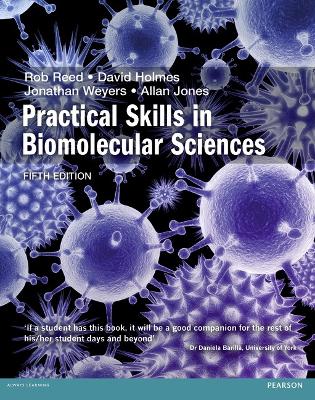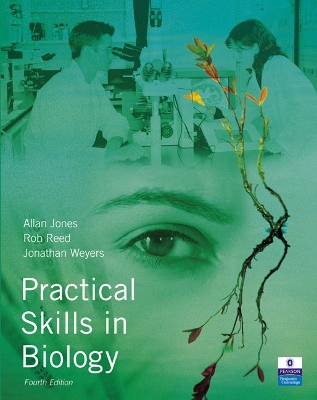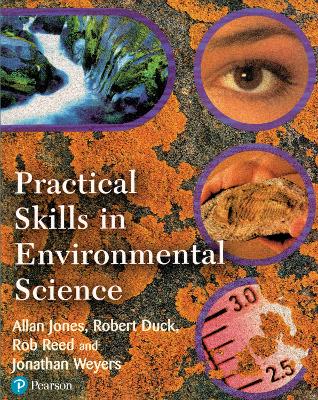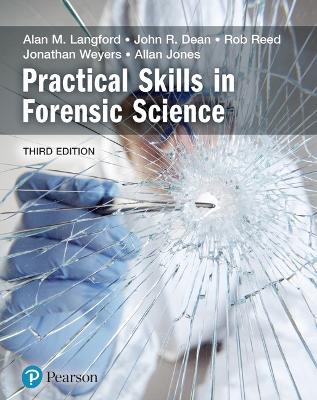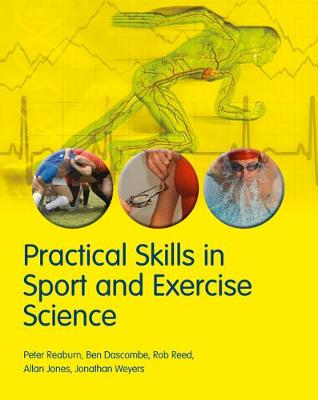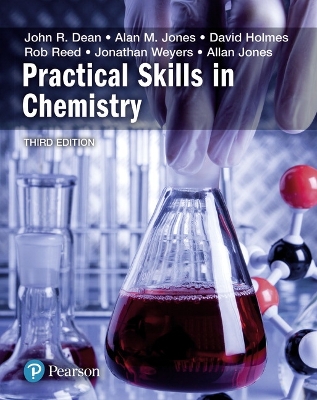Practical Skills
18 total works
Practical Skills in Biomolecular Science
by Rob Reed, Jonathan Weyers, and Allan Jones
Practical Skills in Biology is an indispensable book for undergraduate students in the life sciences. The book provides useful support at all stages of a degree course and underpins any practical course in biology. It is also a valuable resource for teachers of biology in colleges and secondary schools. Laboratory and field studies are essential components of undergraduate training in biology. Practical work must be fully understood and effectively presented, but many students under-perform because they lack basic laboratory skills. This book, now in its fourth edition, continues to provide students with easy-to-use guidance for laboratory and field studies, but in addition it now covers broader transferable skills. As a result the new edition provides guidance and support over the entire range of a typical undergraduate course in biology.
Practical Skills in Environmental Science
by Allan Jones, Robert Duck, Rob Reed, and Jonathan Weyers
Field and laboratory studies are essential components of undergraduate training in Environmental Science alongside transferable skills such as computing and study skills. Practical work must be fully understood and effectively presented, but many students under-perform as they aim to acquire complex skills across a range of disciplines with limited opportunities for practice. Practical Skills in Environmental Science provides students with easy-to-read guidance for fieldwork, sampling, laboratory studies, project work and computing and communication skills, building on the strong reputation of the Practical Skills series as essential texts for those who wish to succeed.
Practical Skills in Environmental Science is an indispensable book for undergraduate students in environmental science. This book supplements any practical course in environmental science and provides useful support at all stages of a degree course. It is also a valuable resource for teachers in secondary schools.
Practical Skills in Forensic Science
by Alan M Langford, John Dean, Rob Reed, Jonathan Weyers, and Allan Jones
This third edition of Practical Skills in Forensic Science builds upon the excellent foundation of its predecessors and provides an easy-to-read guide to help you develop the skills you need to succeed. It retains the key features of earlier editions, with a layout that explains the essential elements of practical techniques and procedures in a step-by-step manner to help you understand their application in the context of forensic science.
Features include:
· Coverage of a wide range of practical aspects from fingerprint recovery, trace evidence examination, bodily fluid examination and DNA analysis, as well as broader skills such as tackling numerical problems and passing exams.
· Case examples, guidelines for documentation and reporting results, plus advice on the legal aspects of forensic science provide you with an understanding of the professional role of a forensic scientist.
· New material on personal development planning, learning styles, e-learning and avoiding plagiarism.
· Updated sections on software for graphical and statistical analysis.
· Worked examples and ‘How To’ boxes provide practical guidance and support.
· Key points highlight critical features of methodology.
· Use of margin tips, definitions and illustrations throughout.
· Additional sources of further study identified for every chapter.
· Safety notes highlight specific hazards and appropriate practical steps to minimise risk.
· Study exercises (and answers) in each chapter help to reinforce learning.
ALAN LANGFORD is Senior Lecturer and Programme Leader in Criminology and Forensic Sciences at Northumbria University, UK; JOHN DEAN is Professor of Analytical and Environmental Sciences and Director of the Graduate School at Northumbria University, UK; ROB REED is Professor of Biomedical Science and Director of Undergraduate Science Programs at CQUniversity, Australia; DAVID HOLMES is Director of Collaborative Programs in Applied Sciences at Northumbria University, UK; JONATHAN WEYERS is Director of Quality Assurance at the University of Dundee, UK; and ALLAN JONES is Senior Lecturer and Chancellor's Award Fellow in Ecology, Environmental Science and Zoology at the University of Dundee, UK.
Practical Skills in Biomolecular Sciences
by Jonathan Weyers, Rob Reed, Allan Jones, and David A Holmes, Dr
Practical Skills in Sport and Exercise Science
by Peter Reaburn, Ben Dascombe, Rob Reed, Jonathan Weyers, and Allan Jones
Practical Skills in Exercise and Sports Science provides an easy-to-read guide to help you develop the skills you need to succeed. It explains the essential elements of practical techniques and procedures in a step-by-step manner to help you understand their application in the context of exercise and sports science.
This text’s unique and comprehensive coverage includes: general advice on practical work; measuring techniques; field tests; statistical techniques; analysis and presentation of data; and study skills.
Practical Skills in Chemistry
by John Dean, David A. Holmes, Alan M. Jones, Allan Jones, Jonathan Weyers, and Rob Reed
Practical skills form the cornerstone of chemistry. However, the diversity of skills required in the laboratory means that a student’s experience may be limited. While some techniques do require specific skills, many of them are transferable generic skills that are required throughout the subject area. Limited time constraints of the modern curriculum often preclude or minimise laboratory time.
Practical Skills in Chemistry 3rd edition provides a general guidance for use in and out of practical sessions, covering a range of techniques from the basic to the more advanced. This ‘one-stop’ text will guide you through the wide range of practical, analytical and data handling skills that you will need during your studies. It will also give you a solid grounding in wider transferable skills such as teamwork, using information technology, communicating information and study skills.
This edition has been enhanced and updated throughout to provide a complete and easy-to-read guide to the developing skills required from your first day through to graduation, further strengthening its reputation as the practical resource for students of chemistry and related discipline areas.
PSK Biomolecular Science 3e PowerPoints on the Web
by Rob Reed, David A. Holmes, Jonathan Weyers, and Allan Jones
Practical Skills in Biology PowerPoint Slides
by Jonathan Weyers, Rob Reed, and Allan Jones
Practical Skills in Biomolecular Science 5th edn PDF eBook
by Rob Reed, Jonathan Weyers, and Allan Jones
Practical Skills in Forensic Science eBook
by Jonathan Weyers, Alan Langford, Rob Reed, David Holmes, and Allan Jones
Practical Skills in Biology 6 PDF ebook
by Rob Reed, Jonathan Weyers, and Allan Jones
Practical Skills in Biomolecular Science 5e Companion Website
by Rob Reed, Jonathan Weyers, and Allan Jones
PowerPoint Slides for Practical Skills in Sports and Exercise Science
by Rob Reed, Peter Reaburn, and Ben Dascombe
Practical Skills in Biomolecular Sciences PowerPoint Slides
by Jonathan Weyers, Rob Reed, Allan Jones, and David Holmes
Practical Skills in Biology 6 PowerPoints
by Rob Reed, Jonathan Weyers, and Allan Jones
Practical Skills in Biomolecular Science 5e PowerPoints
by Rob Reed, Jonathan Weyers, and Allan Jones
